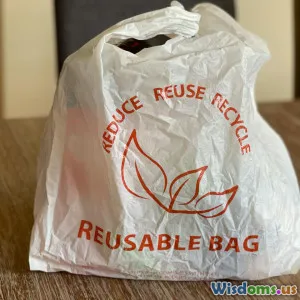
Innovative Solutions for Plastic Waste Reduction
4 min read Explore groundbreaking strategies to combat plastic waste and promote sustainability in this insightful article. (0 Reviews)
Innovative Solutions for Plastic Waste Reduction
Plastic waste is a critical environmental issue, threatening ecosystems, wildlife, and human health. Every year, millions of tons of plastic end up in oceans, landfills, and the environment, taking centuries to decompose. However, innovative solutions are emerging to combat this pressing concern, offering practical ways to reduce plastic waste and promote sustainability.
1. Biodegradable Alternatives
With advancements in materials science, biodegradable plastics are becoming a viable alternative to traditional plastics. These materials, derived from natural sources such as corn starch or sugarcane, break down more easily in the environment. Companies like BioBag produce compostable bags that can decompose in a matter of months, significantly reducing the long-term impact of plastic waste.
2. Plastic Waste to Energy Technologies
Converting plastic waste into energy is another innovative solution gaining traction. Technologies such as pyrolysis allow for the breakdown of plastic into fuel, which can then be used to generate electricity or power vehicles. Companies like Agilyx are pioneering this approach, turning waste into valuable resources while reducing landfill usage and carbon emissions.
3. Community Initiatives and Clean-Ups
Grassroots movements are essential in tackling plastic pollution. Community clean-up events, such as the Ocean Conservancy's International Coastal Cleanup, empower individuals to take action in their local environments. These initiatives raise awareness and foster a sense of responsibility, encouraging communities to reduce plastic usage and participate in recycling efforts.
4. Innovative Recycling Programs
Recycling is crucial for managing plastic waste effectively. Innovative recycling programs, like Terracycle, allow consumers to send in hard-to-recycle plastics in exchange for rewards. This initiative not only diverts waste from landfills but also promotes responsible consumption habits among individuals.
5. Corporate Responsibility and Sustainable Practices
Many companies are adopting sustainable practices to reduce their plastic footprint. Brands like Unilever and Coca-Cola have committed to using recycled materials in their packaging and have set ambitious goals to eliminate single-use plastics. By prioritizing sustainability in their supply chains, these corporations are leading the way in reducing plastic waste.
6. Education and Awareness Campaigns
A critical component of reducing plastic waste is education. Raising awareness about the impacts of plastic pollution and the importance of sustainable practices can drive significant change. Campaigns like #StopPlasticPollution aim to inform the public about the issues surrounding plastic waste, encouraging individuals to make more conscious choices in their daily lives.
Conclusion
Innovative solutions for plastic waste reduction are essential for creating a sustainable future. From biodegradable alternatives to community initiatives and corporate responsibility, every effort counts in combating plastic pollution. By supporting these solutions and making informed choices, we can all contribute to a healthier planet for generations to come.
Rate the Post
User Reviews
Popular Posts





















